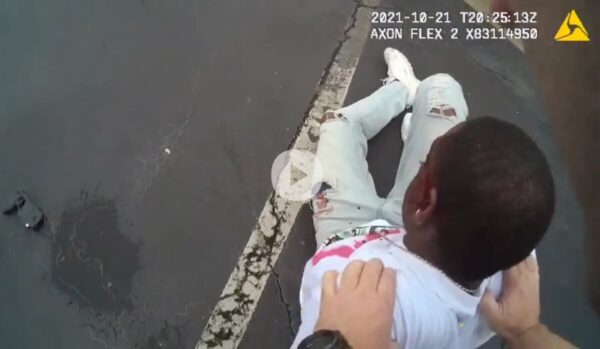A Georgia man has filed a lawsuit against a Gwinnett County police officer after he was left with brain damage from an encounter with the police on Oct. 21, 2021.
Angelo Black was a passenger in a vehicle that was pulled over by members of the GCPD, including Officer Chase Weber, in the Atlanta suburb of Duluth, Georgia.

According to the lawsuit filed on Oct. 11, the vehicle Black was riding in was pulled over for a broken taillight, and rather than issuing the driver a ticket, the police removed him from the vehicle and placed him in the back seat of a police cruiser. Black was also removed from the vehicle. He ran when officers began frisking him.
Trending Today:
- ‘I Thought I Could Vote’: 69-Year-Old Florida Woman Charged with Fraud for Voting After Receiving Registration Card
- Beauty Supply Shop Owner Caught on Camera Grabbing Black Woman By Neck Says He ‘Lost Everything’ and Will Have to Leave Town
Weber gave chase and used a Taser on Black as he attempted to run through the parking lot of the Steak ‘n Shake located at 2110 Pleasant Hill Road, causing him to fall off a median and onto the concrete, unable to break his fall after the shock from the stun gun. Black fell directly on his head, and video footage of the incident shows blood pouring out of his head as he lay on the concrete moaning.
“Defendant was pursuing Plaintiff following a traffic stop while on duty as a Police Officer for Gwinnett County, Georgia,” says the lawsuit obtained by Atlanta Black Star. “Defendant discharged his taser while Plaintiff was jumping from a ledge and in midair, with his back turned, and preparing to land in the lower-level adjoining parking lot. The taser struck Plaintiff, causing him to become unresponsive and unable to break his fall. Plaintiff’s head slammed into the parking lot pavement, resulting in severe brain and head injuries.”
The lawsuit contends that Weber “knew or should have known” that if he deployed his Taser, it could have led to “death or serious bodily injury” for Black.
According to Black’s attorney, Harry M. Daniels, police officers are “strictly prohibited” from deploying stun guns when the suspect is in an elevated position because an unbroken fall — like the one experienced by Black — often results in significant injuries.
“It’s simple. Either Officer Weber was reckless or he just didn’t give a damn,” said Daniels. “Officers like him think that a taser is a [blank] check that they can use whenever, however and for whatever reason they want. That’s reckless, dangerous and illegal… Still, at the end of the day, the taser didn’t cause Angelo Black’s brain damage. Officer Chase Weber did.”
Another attorney representing Black, Reginald Greene, added that Black men often run from the police because they fear they will end up hurt or worse.
“There is no excuse for this,” said Greene. “Black men run from the police because they’re afraid that, if they don’t, they’re going to end up hurt or dead. Unfortunately, through his recklessness and negligence, Officer Weber proved them right.”
Black was taken to the Gwinnett Medical Center and was diagnosed with skull and brain injuries. The 43-year-old suffers from “ongoing emotional distress with significant PTSD-type symptoms including sadness, anxiety, stress, anger, depression, frustration, sleeplessness, nightmares and flashbacks.”
Atlanta Black Star reached out to the Gwinnett County Police Department for comment, and although Sgt. Michele Pihera responded that the agency couldn’t provide any additional statements on this case because of the pending litigation. The spokesperson said Weber “is not an active employee” of the GCPD.
Pihera also sent the GCPD’s Taser policy, which states, “Authorized users should avoid deploying the ECW on persons next to swimming pools, on elevated platforms, or other places where a fall can be more injurious.”
The lawsuit is asking for “punitive damages on all of his claims against Defendant personally to redress his willful, malicious, wanton, reckless, and fraudulent conduct.”


